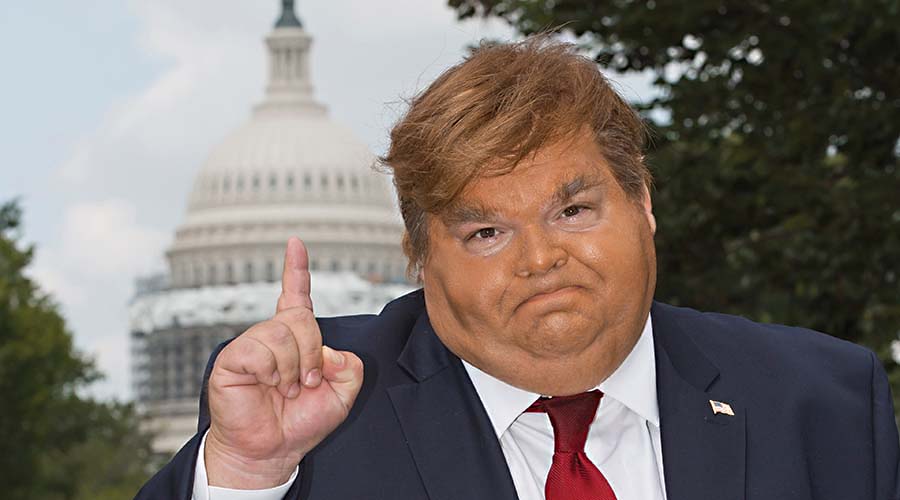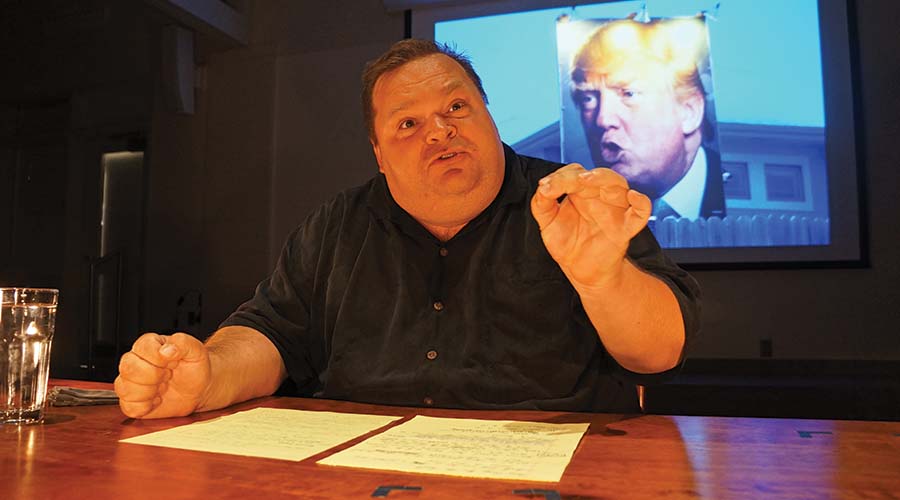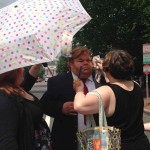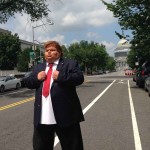“Now you’re looking for the secret. But you won’t find it, because of course you’re not really looking. You don’t really want to work it out. You want to be fooled.”
—The Prestige, screenplay by Jonathan and Christopher Nolan
I’ve always been drawn toward the political within theatre, and I would argue that’s precisely as it should be—from the time of the Greeks, Western theatre was in essence a series of monologues, reports from the outside world on wars, horrors, and wonders that could not be seen on the stage lest they diminish the imagination. The form of the monologues in those ancient plays embodies the naked singularity that sits at the heart of the Western theatrical experience: the one speaking to the many, the single voice telling a story to the audience. That primal form of address finds its use throughout human society, from teaching to preaching to the rule of law, but it is also how we govern ourselves. The act of theatre is inextricably bound with the political, because to be political is to be aware of the performance one is giving—which is why in many ways politicians are more like theatre artists than members of any other profession.
Every four years the great machine of our politics heaves and groans, with pundits waggling their fingers and making dire predictions, and yet somehow despite all the fire and brimstone we’ve survived many, many elections to be standing here today, ready to pontificate again about how This election is like no other election, Accept no substitutes, and Prepare for the (long-awaited but never arriving) end of the world. As a good liberal I have been well trained to consider all sides, which has the unintended but hilarious side effect that it can render one paralyzed; if one’s mind is as open as possible, at a certain point you have no mind to speak of at all. The combination of being willing to consider all the angles with a theatrical tendency toward the dramatic can lead to what I would call apocalypse fatigue—the feeling that the end of the world has been predicted so many times that one just can’t be bothered to believe it anymore.
As a young man I remember that impulse being strongest in my own thinking in the run-up to the election of 2000, on the cusp of the 21st century. I remember arguing persuasively as I worked in garage theatres throughout Seattle that in a two-party system dominated by corporations and banks that there was no difference between the two corporate entities fighting for power. One side would win and another would lose, but fundamentally the differences between the two parties were not as great as the world wanted us to believe. I was far from alone in this belief then, especially among the young. We were idealists and dreamers in both our life and our art, and maybe because we didn’t expect the world to care about the plays we were making, we also didn’t believe that there were demands on us in return. Someone would win, someone would lose, and very little would change.
That’s not what happened. In fact, Election Day passed and no one had won or lost. All the clocks had somehow stopped and a winner didn’t emerge. We looked out blinking at a new world, and days passed, then weeks, and still nothing changed. There was no winner, and over time it became clear that no winner would ever be forthcoming out of the voting process—everything had dissolved down into hanging chads and recounting, and it became terrifyingly clear that underneath a thin veneer of law, what dictates the flow of power is theatre. Whoever tells the best story wins.
We all know how this story ends, but it bears reexamining. The Republicans adroitly controlled the theatre of the post-election, from beginning to end, and in terms of stagecraft the Gore campaign never had a real chance. The Supreme Court gave the election to Bush, but the actual battle had been fought out in the media, in front of TV cameras, in speeches and interviews and positioning. The presidency was won by those best able to control the stage, and as the next decade unfolded I, like many, learned how foolish we had been to once imagine there was no real difference between the two men who had run for president.
I watched in horror as my country killed millions in imperialist wars, approved and used torture, imprisoned people for years without any due process, and rewrote the story of what America means. It happened quickly. Watching this unfold, and knowing that I had stood by as it happened, still haunts me, and as I grew into the artist I am now it marked me deeply. I would not forget again how very real the stakes are in the games of power, or that as theatre artists we are uniquely positioned to understand the game of masks on a level few others can.

All that said, when I started working on a show about Donald Trump a year ago, I wasn’t thinking in such dire and portentous ways. Trump hadn’t yet declared, but there were rumors everywhere that he would, and I thought he would make a fascinating subject. I’ve performed monologues about a number of megalomaniacs—L. Ron Hubbard, Steve Jobs, P.T. Barnum—and felt that Trump fit perfectly. I wasn’t at all concerned about his actual candidacy; I assumed that when it flamed out it would make an interesting final chapter in the piece I was constructing. Everyone knew it would be Bush against Clinton again, and if I’m telling the truth there was an old, cynical part of me that sighed about political dynasties, and how nothing ever really changes.
That isn’t what happened. Donald Trump stormed the Republican primaries, and in a series of idiosyncratic and bizarre maneuvers executed his opponents one by one. It became clear as the primaries dragged on that Trump wasn’t just exceeding expectations—he was setting them. It was his game. And as I listened to his speeches and watched him work I grew increasingly impressed and terrified.
For while I loathe Trump personally and politically, I have to be honest and admit that I admire his work deeply. Whether I would like to admit it or not, our jobs are cousins to one another: We both speak to audiences and control the room. The ends to which we turn our work are wildly different, but the tool sets are not. In the same way a magician must acknowledge the stagework of another master, I have to admire him. He’s very good at his job, and we’re taught in the theatre as artists that there is nothing rarer or sexier than true competency. Donald Trump is very, very good at being Donald Trump.
But as I watched him kill off the other pretenders to the throne, I came to understand that not everyone saw it that way. The media laughed at Trump far longer than I did, and the Republican Party never even realized what was happening to it as he metastasized and took control of their autonomic political functions. For a while I couldn’t understand—I’d look at his dominating poll numbers in state after state, yet read in the media how it wasn’t possible that he would be the nominee. It just couldn’t be possible. I even asked reporters I knew to break it down for me, and I found their explanations curiously circular. It couldn’t be happening because it isn’t possible because it doesn’t make sense and therefore it couldn’t be happening.
I thought I must be missing something the political operatives knew, but now it’s clear what was actually happening: The establishment was experiencing cognitive dissonance, and couldn’t accept what was happening. And in large part that’s because the media, and through them the American people, don’t understand how theatre works.
This would shock reporters everywhere to hear, and it’s doubtful even now that they would agree. In America the idea that the arts are non-essential is a central tenet of our modern world, handed down to us directly from the Puritans, who also weren’t into dancing or other assorted shenanigans. That puritanism sits deep in the heart of our American character, and while it has given us a fantastic work ethic, it also flattens our national imagination regarding abstractions, which are generally viewed with mistrust. Things are black or white, truth or lies. Theatre as an art form perfectly straddles that divide: We tell stories onstage that look like real life, but we know they are not literally happening in front of us. Instead, through mimesis and catharsis, we connect with a larger experience. This is why those in the culture who remain puritans can never truly be friends to the theatre: Our aims and methodologies are literally oppositional.
Watching Trump’s speeches for months made it clear to me how much he was a creature of the theatre. And because the political establishment doesn’t understand theatre, it left them wide open to infection and domination. Hand in hand with the political establishment sits journalism, which Trump has deftly and effortlessly hacked to serve his own needs. The third part of the trifecta is the audience, which Trump manipulates with aplomb to drive them against their better selves. There have been many words spilled about this man and what’s been happening in this unusual election. What I will try to do here that’s different is to see what he is doing through the lens of theatre and performance, which I feel may be the Rosetta Stone our culture needs to actually face him.
The conventional narrative is that Trump lies; Trump lies a lot. And this narrative is absolutely true.
But where the conventional narrative collapses is in failing to answer why the American people would listen to such a liar; after all, liars are bad. Op-ed writers have been churning out piece after piece about this, and how strange it is that his support doesn’t dissolve as his lies are repeatedly exposed. Most political operators have waited for the penny to drop after each new scandal, but his following only got stronger. Then advanced polling began to show that even when people know that specific things Donald Trump says are simply absolutely untrue, they still support him. It’s at this point that many threw up their hands; the only explanation left to many is that the middle of the country is overwhelmingly stupid.
This is crass and untrue. Trump’s popularity doesn’t erode when he lies because the people supporting him are supporting a lifelong performer. When they hear him say things that aren’t true, they don’t hear a trusted source betraying them any more than when Hamlet says he will die onstage we don’t then demand our money back because the actor is alive at curtain call and didn’t actually die. People don’t expect Donald Trump to tell the truth because he’s inoculated himself by being deeply authentic—authentically a person who makes up shit all the time. So when he makes up shit, people hear him and think, “Donald Trump is being very authentic to Donald Trump.”
People outside the theatre often forget that performance runs in two directions: There is the performer onstage, but the audience is performing as well. They are playing the role of an audience, connecting with the image of the person onstage. The people who don’t care that Trump tells the truth aren’t idiots who don’t understand how the world works. They are much savvier than that, and the situation is much more dangerous. They know he is spinning a story, and they like the performance so much they have actively decided that they do not care.
When this exchange is exploited, it becomes a road to demagoguery, and is much, much more dangerous than conventional politics. People believe Donald Trump’s performance because he is remarkably good at being honest. Now people in America’s media can’t understand this; it makes no sense, as he’s clearly lying all the time. But as creatures of the theatre it should be obvious to us; like a great actor, Trump is authentically in the moment, constantly. He says whatever comes into his head, like an enormous baby with poor impulse control—and everyone knows the old advice: Never perform with babies or animals because they will always upstage you. The feeling people have that Trump can be trusted and authentic is real, because what they feel in everything he says is actually true: He promises with each lie and boast that he will absolutely always be Donald Trump, and he delivers. There’s a fundamental honesty in that which connects with audiences. We do not have to personally trust a performer to trust the integrity of their performance, and it is through this unspoken contract of trust that Trump gathers power.
Trump was so devastatingly effective against the other Republican nominees during the primaries because none of them understood that he could say anything he wanted. As politicians, they are constrained by a huge armature of concerns over what they will say in any moment, as anything you say will be recorded and analyzed; an errant word could end your career. So politicians are naturally cautious, which gives all but the very best of them a stilted quality—and no wonder, as they are processing huge amounts of data to make sure they can say what they say.
Trump doesn’t do this. He actually gains power by being brash and saying whatever comes into his mind. The rest are all working from scripts while he is performing improv. And while this makes him incapable of articulating even one coherent policy idea, it does make him a tremendous jamming device and spoiler.
He also does the most damage when he happens to tell the truth. Trump is the one who looked at Jeb Bush and declared him “low energy,” a summation so perfectly apt and accurate a whole nation sighed and thought, “Thank you. That’s exactly what it is!” When Jeb talked about his brother “keeping us safe” to great applause, it was Trump who correctly said what no one in Republican circles can ever say: that 9/11 happened under Bush and he obviously didn’t keep us safe at all. That moment in the Republican debates perfectly captures the best parts of Trump’s appeal: As a disruptor, he gains strength in saying the thing no one else can say, and that includes truths we don’t want to acknowledge. He is fundamentally right in his stump speeches that both parties have turned their backs on rural America, and he’s right that the dissolving of America’s industrial base is a tragedy both parties openly participated in. These powerful words implicating both parties have the strength of the messenger in our Greek plays arriving to bring the news, and everyone in politics underestimated how much people needed to hear them.
One under-acknowledged dark side of Trump is that he was trained as a young man by Roy Cohn, the notorious figure we in the theatre can never forget for his central role of Tony Kushner’s Angels in America. McCarthy’s advisor, and the architect of his Senate hearings to ferret out alleged Communists in the U.S. Army, Cohn understood deeply how to stoke and exploit hate. Late in his life, Cohn served as Trump’s lawyer and advisor for 13 years, and it was Cohn to whom Trump was an apprentice. Trump learned how to lie in the biggest ways: to take something that was absolutely true—provocatively and totally true—and surround that with clusters of lies. When done artfully the value of that central truth permeates the whole, so that the entire bundle is perceived as being true. He uses that technique with great skill to grow his image and power. That terrible man that Kushner wrote about so eloquently is not only a dramatic construct—he was the direct architect of the candidate who is running today.
Following Cohn’s lead, Trump stirs up hatred, and has used it to sharpen and refine his candidacy. He feeds the hunger of those the Republican Party has teased for generations with dog-whistled racism, giving them now exactly what they always wanted: open, unadulterated racist and nativist speech. It is pointless to wonder if Trump believes the things he says—some he does, many he does not. What matters is that he will use everyone he touches to amass personal power at any cost. This is where knowing both Trump and Cohn’s history is illuminating: Rest assured that once he gets power, he will not let it go. The blacklisting, intimidation, and outright threats Trump has used throughout his career and in this campaign will only grow with the presidency, and if he should win that office he will exploit it to revenge his slights, fulfill his hungers, and oppress his people. This is not a threat; it is Trump’s strangely honest promise, delivered with the Donald’s signature flair, lopsided smirk, and shrug.
Yes, this election is not like others. A disruptor has broken the system, and now by taking advantage of the two-party system has made it appear that he is just another conventional choice. As someone who understands theatre intimately, and has watched how poorly my nation seems to understand it, I cannot underestimate the graveness of this threat. Trump’s opponent is a very experienced woman whom I have no doubt is capable of leading the country, but she is not a charismatic politician, nor is she particularly good at running for president. Following a two-term Democratic administration, the candidate she most resembles in modern history is Al Gore, except this time she’s running against a mercurial, shapeshifting disruptor who doesn’t have to follow the rules. We are not waiting any more for the fire and brimstone—this is it. We’re in it now.
Some, I’m sure, will balk at this. They will look at the poll numbers and I hope they’ll find that the worst is not coming true, and then smile and say, “Well, I’m sure this seems alarming, but it always does.” Then they’ll open their paper and go back to sleep, knowing this was never as bad as some people think it was going to be.
What keeps me up at night is that Trump has broken the system, a system rotted away through years of interparty viciousness and neglect. We set the stage that he has walked out on and taken as his own. But even if his candidacy fails, right now people are watching him and taking notes, in the same way that while George Wallace failed with his segregationist platform, Nixon learned from him. Nixon’s calculation was: “We’ll be racist like Wallace, but temper it. Don’t say black, say…welfare.” Out of that the Southern strategy was born, of which we are watching the sickly sweet fruit today. Trump has blazed a new path, and if you think this is over, and that no one else will now walk on it, you are lying to yourself because it is easier than the truth.
It will be hard work, teaching and showing America what theatre means and how it works, taking the magic trick apart, opening the box to reveal the woman whole and undivided, demonstrating that the rabbit was always in this hat or that one. Those of us in the theatre have a vision that the world badly needs. We are used to being ignored, but we may have forgotten how deep and universal our form is. Whether we wanted the job or not, we have a role to play in the story that is unfolding.
Mike Daisey is performing his latest monologue, The Trump Card, in theatres across the country. You can download a transcript of the show soon at his site, mikedaisey.com, under an open license and perform or give readings of it royalty-free anywhere, any time through the election.











